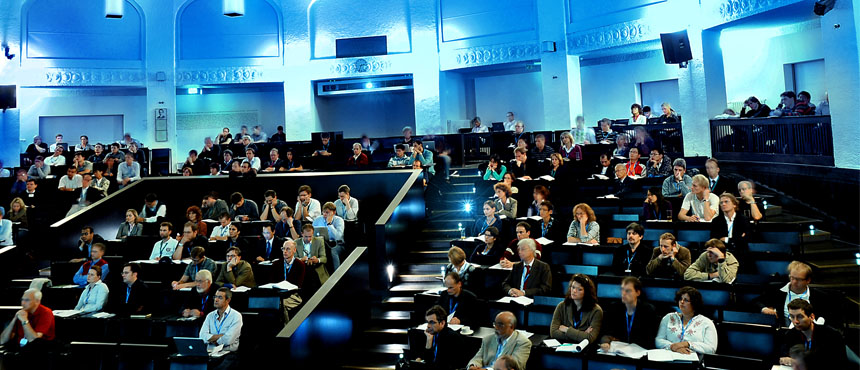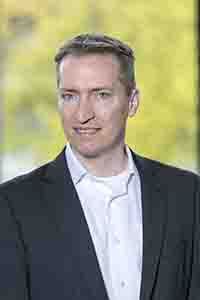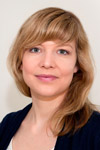Install this application on your home screen for quick and easy access when you’re on the go.
Just tap then “Add to Home Screen”

Time 18:15–19:00, Thursday 23 August
Location Audimax
 |
Rainer Forst |
Normativity and Reality: Thinking Politically About PoliticsIt goes without saying that a scientific perspective on the social and political world has to be a realistic one. But what really is the reality political science has the task of explaining and understanding? Is it a reality of infinite antagonistic power struggles based on individual and collective interests – and thus any form of normativity supervenient on such interests and struggles? Or is it the other way around: do normative convictions and justifications ground the interests that individuals and collectives pursue? If this latter perspective is correct, power is generated in the discursive space of justifications, and the exercise of power depends on the capacity to rule the normative space of reasons for others. Yet if social and political reality is a reality of justifications, what distinguishes better justifications from worse ones– and what distinguishes different forms of exercising power? I aim to discuss these issues and to suggest some institutional conclusions that follow from these reflections. |
|
|
Rainer Forst studied with Jürgen Habermas in Frankfurt and with John Rawls at Harvard. Forst received his PhD in Philosophy from Goethe University in 1993 with his Kontexte der Gerechtigkeit (Suhrkamp, 1994; Engl. Contexts of Justice, University of California Press, 2002). Thereafter, he taught at the Free University Berlin, and in 1995/96 and 1999 he was Visiting Professor at the New School for Social Research in New York City. From 1996 to 2002, he taught in Frankfurt and received his 'Habilitation' with Toleranz im Konflikt (Suhrkamp, 2003, Engl. Toleration in Conflict, Cambridge University Press 2013). In 2003, he received a Heisenberg Fellowship from the German Research Foundation. In 2005/06 he was the Theodor Heuss-Professor at the New School and since 2004 has been Professor of Political Theory and Philosophy in Frankfurt. Since 2007, he has been co-director of the Research Cluster 'The Formation of Normative Orders,' a major interdisciplinary research centre funded by the German Excellence Initiative. He has also been a member of the founding directorate of the new Institute for Advanced Studies of Goethe-University at Bad Homburg near Frankfurt (where he is a Permanent Fellow) and is Director of the Research Center Justitia Amplificata based in Frankfurt. He is also Research Professor at the Berlin Social Science Center. Rainer Forst's Das Recht auf Rechtfertigung (Suhrkamp) appeared in 2007, published in 2012 as The Right to Justification (Columbia University Press). In 2009, he was Harris Distinguished Visiting Professor at Dartmouth College. In 2011, Kritik der Rechtfertigungsverhältnisse (Suhrkamp) appeared (Engl. 2013 from Polity Press as Justification and Critique). In 2013, he was a Noël Fellow at New York University. His Normativität und Macht (Suhrkamp 2015) just came out with Oxford University Press as Normativity and Power. Rainer Forst serves as Associate Editor of Ethics, is part of the Executive Editorial Committee of Political Theory and is on the board of numerous international journals such as European Journal of Political Theory and Contemporary Political Theory. In addition, he co-edits the series Theorie und Gesellschaft and Normative Orders (both with Campus Verlag). In 2012, he received the Gottfried Wilhelm Leibniz Prize of the German Research Foundation, the highest honour awarded to German researchers. He is a Member of the Berlin Brandenburg Academy of Sciences and Humanities. |
Time 14:00–15:30, Thursday 23 August
Location Lecture Hall A, VMP 5
 |
Chair Sigrid Rossteutscher, Goethe-Universität Frankfurt |
|
Rising support for populist parties has disrupted the politics of many democratic societies. The Brexit vote and the electoral success of Donald Trump are the most visible consequences of this development. The retrogression of Turkish democracy looms large as well. But even if populists, most of the time right wing, are not successful at the ballot box, they impact heavily on national and international politics and have the power to shift politics in a more illiberal as well as isolationist direction. This is true of Marine le Pen as well as Gerd Wilders, to name just the latest right-wing non-winners of elections. In both countries, France and the Netherlands alike, we can easily observe, how for example national values became more important in the political discourse and how immigration policy clearly shifted to the right. And even Germany, that was free of a right-wing populist movement or party for a very long period of time, with the rise of the AfD has a successful newcomer in this corner of the political field. The question of course is: What explains the successful establishment and in many cases persistence of those parties? What explains the push towards populism and the phenomena of ‘democratic regression’? And are the explanations all the same for Poland and France, Great Britain and Germany, the Netherlands and the Scandinavian countries, for the United States of America and for countries like Turkey? Several theories attempt to give answers to this question. Some talk about economic insecurity as the main driver of the electoral success of right wing populists. Others broach the idea of a cultural backlash, entertaining the following line of thought: Some socio-cultural groups like white middle-aged men in the United States have the feeling to have been neglected in political discourse and practice for too long. They now raise their voice and try to regain lost social and political ground. Another interpretation, close to the self-perception of those right-wing groups, asks whether this upheaval is due to a deep dissatisfaction with the ruling political elites. From a sociological perspective one may ask, whether we actually see the consequences of a new socio-structural cleavage. Throughout the post-world-war-II era the cosmopolitan metropolises economically as well as culturally separated more and more from the rather parochially inclined Hinterlands. The metropolises are not only open to alternative life styles and the cohabitation of different cultures. Based on service and knowledge industries their social fabric shifted away from traditional occupations towards social strata which thrive with and profit from globalization. On the other hand the Hinterlands are more and more detached from progressive economic developments and at least to some extent jeopardized by the economic forces of globalization. As a consequence, people there seem to develop attitudes that are very conservative socially and culturally, more isolationist, nationalistic and even antidemocratic. This Roundtable seeks to explore this topic further, pitting against each other different interpretations of what we currently observe in elections and referenda throughout the established democracies, not to speak of the more recent democratic transformations. It will ask as well, whether we are observing the beginning of a structurally based comprehensive democratic regression, or whether we see normal swings of attitudes in democracies that we need to learn to accept and live with. |
|
|
Speakers
|
Time 16:00–17:30, Friday 24 August
Location Lecture Hall A, VMP 5
 |
Chair Andreas von Staden, Universität Hamburg |
|
Expanding in numbers and competences for most of the post-Cold-War era, multilateral governance institutions at the regional and global level have come under stress in recent years as member states and political movements within them increasingly seek to redefine their jurisdictions, to repatriate some or all regulatory competences to the nation-state, or to recalibrate the exercise of their decision-making authority. The exit of the United Kingdom from the European Union may be the most prominent example of this development, but similar trends are observable across regions, institutions, and issue areas: The current US administration has thrown into doubt the United States’ commitment to various governance arrangements, including NAFTA the WTO, and the UN; Latin American states have been assembling under the roof of UNASUR, an organisation that makes even less pretensions to becoming a supranational organisation than did its precursors in the region; several African states are withdrawing from the International Criminal Court while members of the South African Development Community have significantly curtailed the jurisdiction of the SADC tribunal after it had forayed into sensitive political territory in one of its very first cases; and with respect to the European Court of Human Rights, member states have moved to enshrine the principle of the margin of appreciation that foregrounds state discretion formally in the European Convention on Human Rights. Last but not least, nationalist parties and political movements that are at best critical, at worst hostile to existing forms of governance beyond the state have been in ascendance across countries and continents. Some adjustments of the design and operation of international regimes as well as some fluctuation in the membership of international organisations has always taken place and is not per se inimical to global governance, but the cumulation of political positions the world over that express a preference for building back the existing governance architecture to unshackle nation-states, at least in part, from what are perceived as undue interferences with national sovereignty and interests is a development that has become particularly noticeable over the last ten or so years. This Roundtable will address the causes and consequences of this move away from multilateralism and towards greater emphasis again on the role of the nation-state as the principal unit of decision-making, for problems arising within states as well as for externalities that affect neighbouring states and, possibly, the globe. |
|
|
Speakers
|
Time 14:00–15:30, Thursday 23 August
Location Lecture Hall B1, VMP 5
 |
Chair Heidi Maurer, London School of Economics and Political Science |
|
This Roundtable is organised in conjunction with the ECPR Standing Group on Teaching and Learning. Many of us care about teaching. We invest in developing good courses, staying up to date with innovative teaching methods, and redesigning course materials to reflect new developments and outcomes of scholarly research. But what role does (good) teaching play in advancing political scientist’s academic career? How can we take teaching seriously, and still ensure there is enough time for research and publishing? How can we care seiously about our students, while not carrying the burden of constant overtime? In this Roundtable, we bring together a mix of early-career, mid-career, and established academics from different national higher education backgrounds (ensuring good gender, experience and geography background) to discuss the role teaching could (and should) play in our academic self-understanding. We want to discuss the increasing trend to distinguish between research and teaching job profiles, and how to react to higher education systems, where university administrations talk about the importance of teaching, but then hire according to publication records. We also want to reflect on the responsibility of our community in these trends. The Roundtable's aim is not to come up with definite answers to those questions, but to provide a platform for those questions that many of us are struggling with. We want to raise awareness of the different positions, strategies and trajectories that successful academics choose. And we want to show our colleagues' differing experiences and views by providing a platform to a variety of speakers who, throughout their careers, have demonstrated that they are excellent scientists who care also about teaching. |
|
|
Speakers
|
Time 16:00–17:30, Friday 24 August
Location Lecture Hall B1, VMP 5
 |
Chair Katjana Gattermann, University of Amsterdam |
|
This Roundtable is organised in conjunction with the ECPR Research Network on Political Communication. According to political observers the ‘truth’ has had a hard time in recent political developments. From Brexiteers proclaiming that they've had enough of experts, to fake news seemingly propagated by both ends of the political spectrum, to so-called 'alternative facts' proliferated by the Trump administration, many commentators propose that we now live in times of post-truth politics. Moreover, it appears that public scrutiny has shifted from politicians to traditional media, who face harsh resentment from enraged citizens, such as German Pegida-followers shouting Lügenpresse at German mainstream media. Populists are increasingly gaining support; and mainstream politicians fear that the media contribute to the polarisation of politics and society. Social media in particular is accused of nourishing so-called echo chambers in which citizens are no longer exposed to diverse opinions or objective news. On the other hand, investigative journalism in particular continues to have a highly respected position in society, and is still considered an authoritative voice, as, for instance, the considerable rise in subscriptions to the New York Times or the Washington Post in 2017 suggests. Moreover, democratic protests for press freedom in countries such as the US, Poland or Hungary offer evidence of societal resistance against the institutionalisation of post-truth politics. With a view to the upcoming major elections around the world, in particular the 2018 midterm elections in the US, and the 2019 European parliamentary elections, these developments are thus of high societal and academic relevance. However, critics of the post-truth thesis warn not to overemphasise apparent effects on political behaviour and provide counter-evidence to the alleged trends by asking alternative questions such as: Is fake news indeed a new and global phenomenon? Are these worries mainly fuelled by the fear of economic survival by the (mainstream) media themselves? And, are individual citizens indeed less likely to be exposed to diverse opinions and, respectively, more likely to be misinformed; or are individuals nowadays not more entrapped in so-called ‘filter bubbles’ than before? These and many more questions will be addressed during this Roundtable, in which scholars of political communication and journalism discuss the latest developments with respect to post-truth politics, scrutinise its effects and analyse implications for future research. |
|
|
Speakers
|